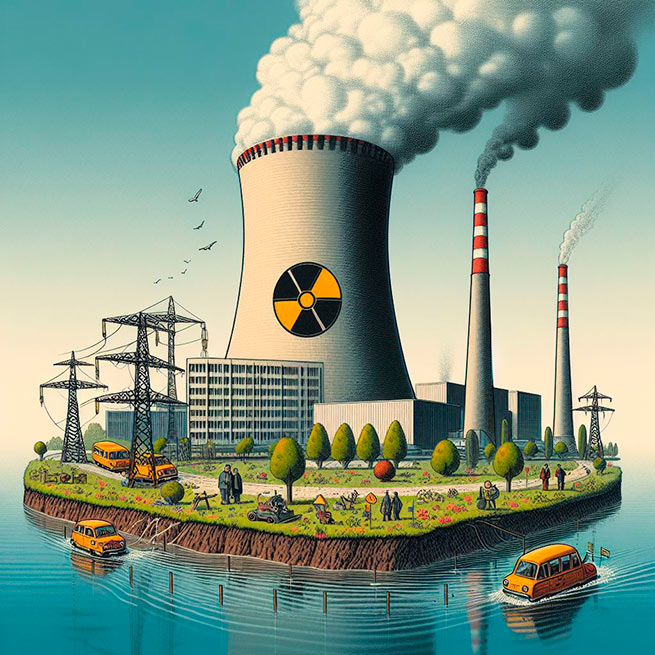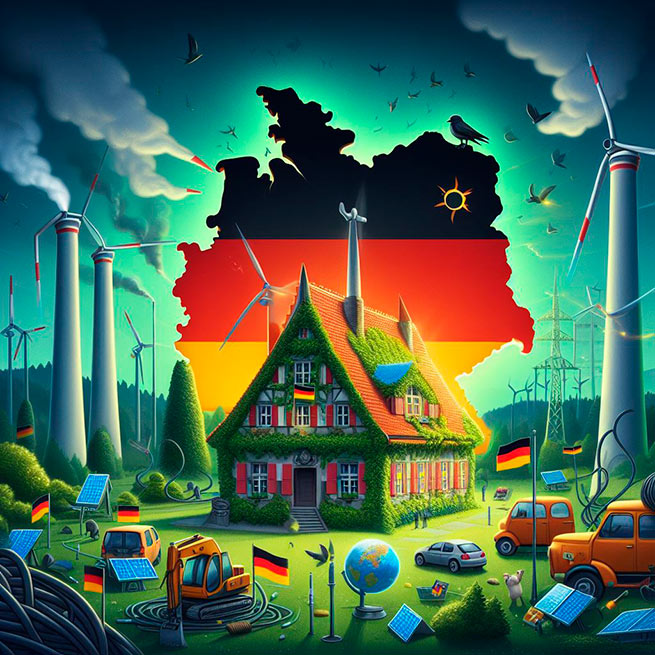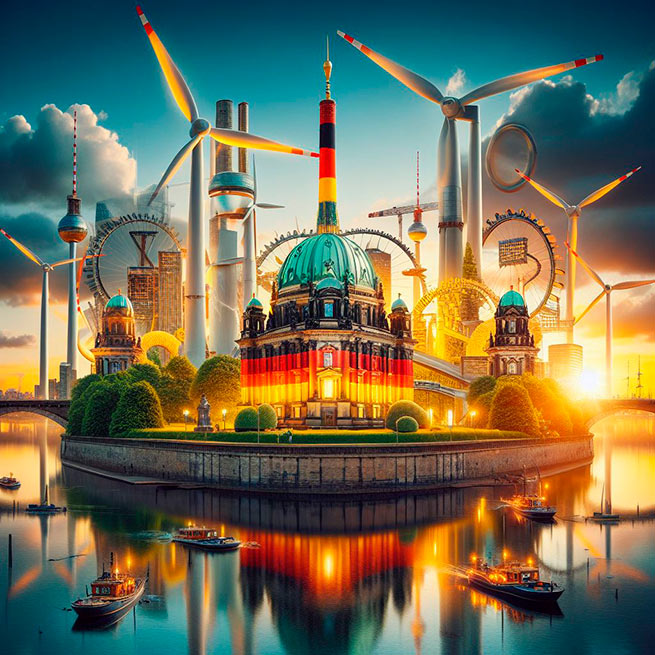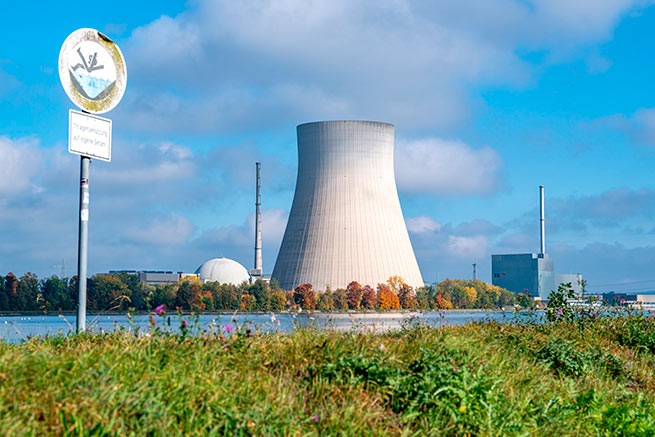Germany has estimated the economic losses from the closure of nuclear power plants. The welfare losses of German citizens are estimated at billions of euros, and the amount continues to grow, because the energy problem cannot yet be solved. And they are unlikely to find a solution in the foreseeable future.
The Germans had trouble with atomic energy from the very beginning. But they were pioneers in nuclear fusion research. But every time Germany achieves something in developing the atom, politics intervenes and everything goes to hell.
Before World War II, the great scientists Hahn, Einstein, Meitner, and Heisenberg were there. And then cheerful party members came and declared the whole thing a Jewish party. In fact, of course, for good, because otherwise the scientists would have handed the atomic bomb directly into Hitler’s hands.
Then the influence of politicians on science and industry was repeated in a caricatured form, when first Merkel and then the green eco-fascists took over and killed the German nuclear program. History repeats itself in the form of a farce, as we know.
The first experimental nuclear power plant was launched in Bavaria in 1960, and it produced less than 1000 MW (for comparison: the Russians opened the first in the world in 1954 in Obninsk). The Germans commissioned the first station that can be considered commercial in 1969 in Obrigheim, Baden-Württemberg. The reactor had a license from the United States – to the issue of sovereignty.
The idea of obtaining sustainable, inexpensive energy in a country where the only resource available is brown coal was recognized as progressive. And now West Berlin wanted to have its own nuclear power plant, and BASF wanted its own. Both projects were canceled, but we will remember that BASF already understood in the sixties: something had to be done with energy. Then two units of the Biblis nuclear power plant were launched. East Germany also built a nuclear power plant with Soviet reactors.

How Germany began to buy “dirty energy” by abandoning nuclear power plants. Created with AI
The public struggle against their construction began in the seventies in the city of Wil in Baden-Württemberg. Civil disobedience led to violence, and the police were accused of overstepping their authority. The activists' victory inspired their comrades in other places, but the German state, if it decides to do something, will do it. And then the activists themselves came to the government – the same “traffic light” coalition that the Germans have now.
After the unification of Germany, the first thing they did in the former GDR was to close nuclear power plants under the pretext of the danger of the reactors, nodding to Chernobyl. Although immediately after the accident the German state did not give a damn about that disaster, in Germany all nuclear energy remained as it was.
Today, they most often remember Chernobyl as the reason for Germany’s withdrawal from the nuclear project and almost never mention Fukushima. But it was Fukushima that frightened Chancellor Merkel so much that she, with a voluntaristic decision, ordered the closure of all remaining stations.
In fact, the greens pushed for the gradual shutdown of nuclear power plants much earlier, when they were still in the government of Gerhard Schröder. The plan at the time called for closure by 2022.
But the Vice-Chancellor of Germany, the main adherent of this idea, is very pleased. Apparently his main task is to harm Germany, and he copes with it successfully.
It is clear why Schröder did this. He understood perfectly well that Russian gas through Nord Stream, and then Nord Stream 2, would completely replace nuclear energy, and would also allow the closure of brown coal mines and power plants that operate on it.

How Germany began to buy “dirty energy” by abandoning nuclear power plants. Created with AI
Merkel, who came after him, pushed back the plan by 12 years. But the Fukushima disaster forced her to change everything again. And she also relied on Russian gas as a stable source of cheap energy.
In September 2011, Siemens, which was responsible for the construction of all 17 existing nuclear power plants in Germany, announced that after the Fukushima disaster it would no longer build them anywhere in the world.
By this point, the campaign against CO2 and other climate change had already entered into force. But then it turned out that nuclear power plants do not emit any CO2, so they can be considered the greenest area of energy. And all the alternatives – a return to coal and even wind turbines – damage the environment on a much larger scale.
But the politicians didn't care about it. Once upon a time, a German politician said that the transition to green energy for consumers would be “No more expensive than a scoop of ice cream.” He still remembers this ball to this day. Never in the history of mankind has ice cream been so expensive.
It would seem that there is a Minister of Energy from “Green” Robert Habeck. And he must explain to voters why zero-emission nuclear power plants are bad and restarted coal plants are good, even though they are what the greens have always fought against. Do you know how he explains this? But no way. Politicians in Europe have not been held accountable for the “market” and their actions for a long time. This is the new democratic reality: if you ask the government something, you are on the extreme right. Most likely a fascist.

How Germany began to buy “dirty energy” by abandoning nuclear power plants. Created with AI
Wolfgang Kubicki, deputy leader of the Free Democratic Party, stated that “Germany has the safest nuclear power plants and shutting them down would be a dramatic mistake with painful economic and environmental consequences”. Other party members also called for maintaining nuclear power plants, just in case they were needed in the future. Did not help.
Now Germany buys the same nuclear energy from France, where nuclear power plants are operating quietly. The Germans buy coal energy from Poland, which has been bullied for decades for dirty coal power plants.

How Germany began to buy “dirty energy” by abandoning nuclear power plants. Created with AI
And entire fields of wind turbines are unable to produce stable energy for the German industry. And enterprises are moving production to the USA and China. It turned out great. At five.
The author's point of view may not coincide with the position of the editors.







More Stories
Borrell: "Europeans will not go to die for Donbass, but they could help Ukrainians stop dying for Donbass"
Court in the Mati case: “10 euros a day is the price of the lives of our children”
Mati-Tempi: questions about the level of administration of justice, acquittals for the guilty